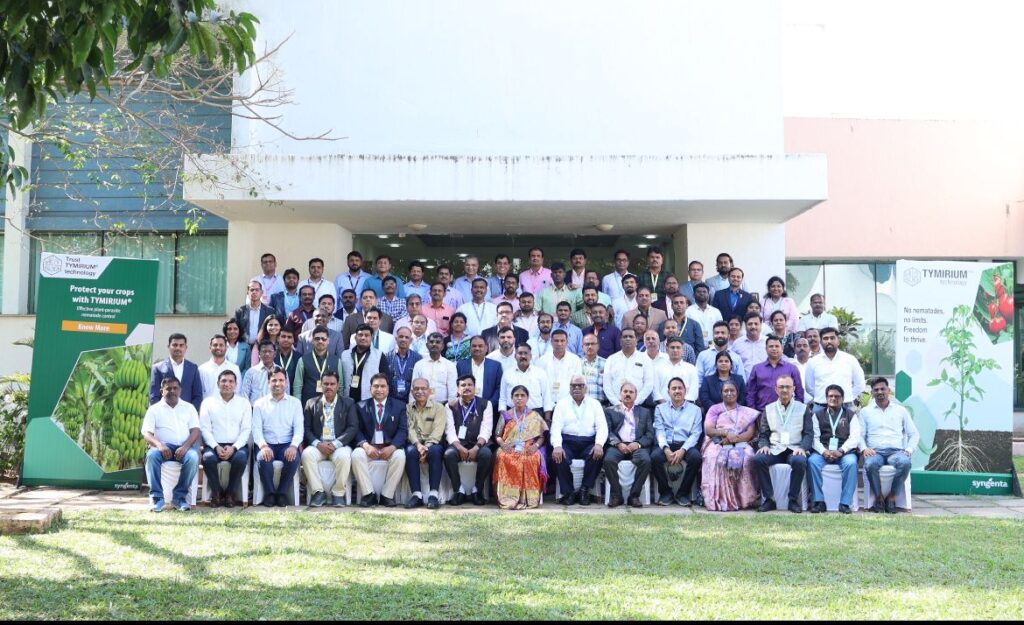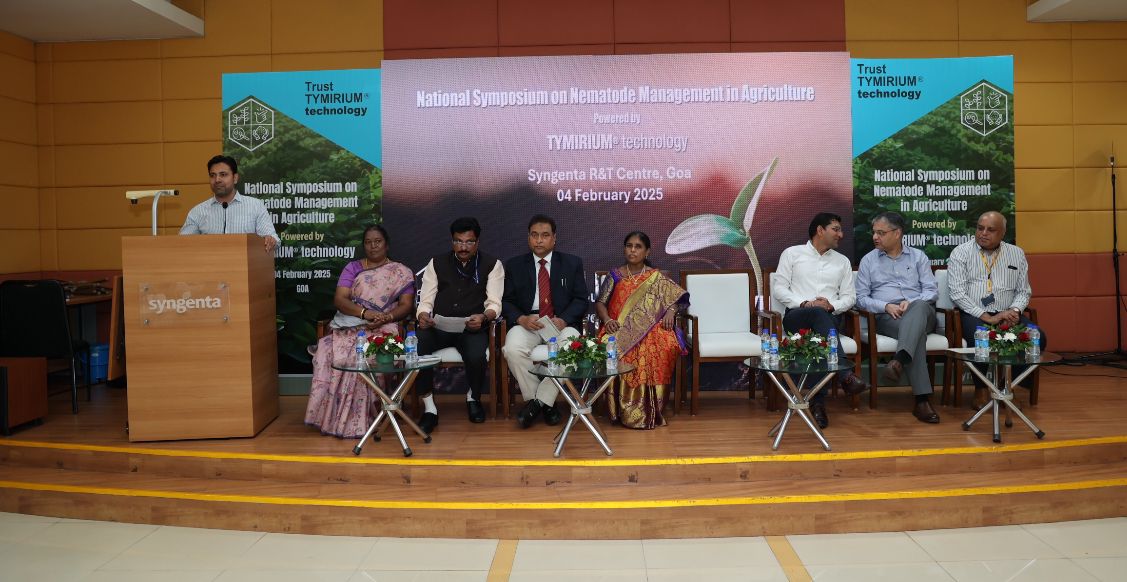- In India, annual crop losses due to major plant parasitic nematodes are valued Rs 25000 crore
- Collaborations are essential to ensure we can feed the world while meeting the challenges in crop protection, said Susheel Kumar, Country Head and MD, Syngenta India
- 100 scientists gather at Syngenta R&T Centre, Goa to discuss on Nematode Management
Pune 5th February- In a first-of-its-kind initiative, over 100 agricultural scientists from across the country convened to address the growing threat of nematodes — a major cause of crop losses, resulting in an estimated financial impact of Rs 25,000 crore annually. At a symposium in Goa organised by Syngenta India, experts emphasized the urgent need for effective nematode management to safeguard soil health, sustain crop productivity, and minimize chemical interventions. While acknowledging the government’s agriculture-focused Budget, the scientists urged stronger investments in scientific research and a more robust R&D pipeline to combat this ‘silent killer.’”
At a national symposium on ‘Nematode Management in Agriculture’ experts highlighted the devastating impact of nematodes, microscopic worms that attack plant roots, causing stunted growth, reduced yields, and heightened vulnerability to diseases. They emphasized the need for sustainable management strategies, including crop rotation, resistant plant varieties, and biological control agents, to mitigate losses and ensure long-term agricultural productivity.

The day-long symposium, held at the Syngenta R&T (Research & Technology) Centre in Goa, aligns with Syngenta India’s commitment to collaborative partnerships with universities and research institutes. The initiative aims to develop technology-driven solutions for nematode management while increasing farmer awareness about its impact.
In his inaugural address, Susheel Kumar, Country Head and MD, Syngenta India Pvt Ltd, emphasized the critical role of farmers in addressing agricultural challenges. “Farmers are at the heart of efforts to grow the food we need while protecting vital resources. Our technologies tackle key agricultural challenges, and innovation continues to drive significant productivity gains. Collaborations between industry and academia are essential to transforming Indian agriculture,” he said.
Speaking on the impact of plant parasitic nematodes on crop yields, Vinod Shivrain, Head of Crop Protection R&D at Syngenta India, said, “In India, annual crop losses due to major plant parasitic nematodes are estimated at 19.6 percent, amounting to Rs 25,000 crore. Despite this, farmer awareness about nematodes remains minimal, making it essential for all stakeholders to work together in addressing this issue.”
He further added, “Our goal is to raise awareness, demonstrate innovative technologies, and develop effective, sustainable solutions to tackle plant parasitic nematodes. Through partnerships between the corporate sector and academia, we aim to leverage technical expertise and resources to manage the nematode-disease complex more effectively and ensure long-term agricultural resilience.”
Dr. Pankaj Singh, Head of Nematology at IARI, New Delhi, highlighted the often-overlooked threat posed by nematodes, saying, “Nematodes present a hidden danger to crops, as their impact remains unnoticed until significant yield losses occur. By the time farmers detect the damage, it is often too late.”
He highlighted the importance of awareness and collaboration in addressing this challenge. “Raising awareness and forging partnerships are essential to equipping farmers with the knowledge and tools needed for proactive nematode management. Early detection and preventive measures can help safeguard yields and promote sustainable farming practices,” he added.
Dr. R. Sarada Jayalakshmi Devi, Vice Chancellor of Acharya N.G. Ranga Agricultural University, Guntur, Andhra Pradesh, focused on the significant yield losses caused by nematode infections in horticulture during his keynote address. “Plant parasitic nematodes primarily feed on underground plant tissues such as roots, rhizomes, tubers, and bulbs, making them invisible enemies. There is a pressing need for nematicides that are both safe and effective,” he stated.
Dr. Devi further stressed the importance of collaboration between government institutions, universities, and industry in tackling plant parasitic nematodes. He highlighted the growing threat of the rice root-knot nematode, which was previously considered a severe issue only in upland areas but is now emerging as a major concern across rice farms nationwide. “Strengthening research and developing integrated management strategies through joint efforts will be key to mitigating this threat and ensuring sustainable crop production,” he added.
Kumar informed that, “We are spending 10 percent of turnover on R&D to bring new innovations, which is the highest among any industry. As a global innovation powerhouse, we lead the way in accelerating game-changing innovation to bring farmers safe and sustainable new products.”
Reflecting further, Kumar said, “Our scientists breed thousands of new seed varieties and explore over 100,000 new compounds every year. Our products help farmers to transform agriculture. We seek and move into new areas that help make farmers even more successful. This national symposium opens doors for more collaboration, knowledge sharing and work jointly to address nematodes and other soil diseases issues.”
Dr RM Sundaram, Director, ICAR-IIRR, Hyderabad, Dr MR Khan, Dean, AMU, Aligarh, and Dr Pankaj Singh, Head, Nematology, IARI-New Delhi, also shared their inputs on the occasion.
About Syngenta
Syngenta is one of the world’s leading agriculture companies. Our ambition is to help safely feed the world while taking care of the planet. We aim to improve the sustainability, quality and safety of agriculture with world class science and innovative crop solutions. Our technologies enable millions of farmers around the world to make better use of limited agricultural resources. In more than 100 countries we are working to transform how crops are grown. Through partnerships, collaboration and The Good Growth Plan we are committed to accelerating innovation for farmers and nature, striving for regenerative agriculture, helping people stay safe and healthy and partnering for impact.
To learn more, visit us at www.syngenta.com, www.syngenta.co.in

